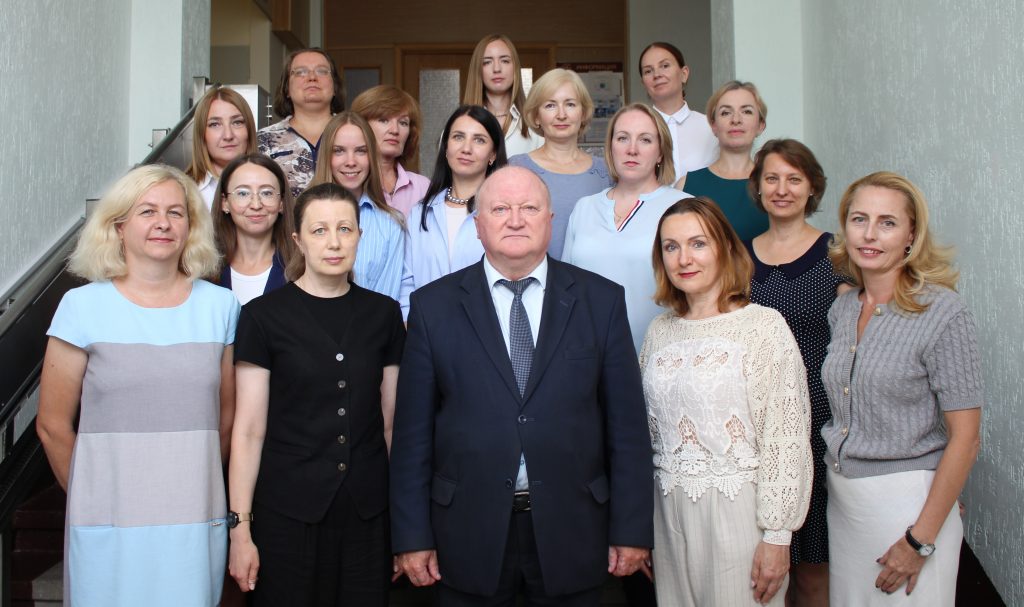
The Laboratory was established in 1955 by Nikolay V. Turbin, the Academician of the National Academy of Sciences of Belarus and of the Russian Academy of Agricultural Sciences. Since 1971, L.V. Khotyleva, the Academician of the National Academy of Sciences of Belarus, was in charge of the Laboratory. Since 2007, it was headed by V.V. Titok, D.Sc. in Biology. Since 2010, after the structural reorganization, the Laboratory has been under the direction of A.V. Kilchevsky, the Academician of the National Academy of Sciences of Belarus.

At present, the Laboratory’s staff consist of 20 members: 1 D.Sc. (1 Academician of NAS of Belarus), 7 PhD and 12 staff members without a scientific degree.
The large-scale molecular genetic studies of gene polymorphism associated with economically valuable traits of vegetable crops of the Solanaceae family (carotenoid and anthocyanin accumulation, disease resistance, plant habitus and functional male sterility) have been conducted. Together with the specialists of the Belarusian State Agricultural Academy, varieties and hybrids of tomato (59) and sweet pepper (15) have been developed using classical and marker-assisted selection methods. Methodological Guidelines “Marker-assisted Selection Technology for Tomato Forms with High Biochemical and Technological Properties of Fruits” have been published and approved by the Ministry of Agriculture and Food that are used for services in DNA typing of fruit quality genes and disease resistance of tomato specimens and have been implemented into the educational process of the Belarusian State Agricultural Academy (the Act of June 14, 2024).
The specifics of the structure and expression of genes affecting grain quality indicators (accumulation of protein and minerals in grain, baking qualities) have been studied in wheat lines with the genetic material of related species. A positive effect of the introgression of foreign genetic material on the nutritional value of wheat grain has been identified. Introgressive lines with consistently high grain quality indicators have been singled out and provided for the purposes of genetic research and practical use to the scientific and breeding institutions of Belarus, Russia and Tajikistan (Transfer Agreements of October 15, 2019; February 22, 2022; November 21, 2022; January 31, 2023; and June 28, 2024).
Using next-generation sequencing (NGS) and quantitative PCR, molecular genetic and epigenetic markers of the risk of recurrence and/or progression of a malignant tumor in patients with non-small cell lung cancer and colorectal cancer have been identified. Methodological Guidelines “DNA Technology for the DNA Testing of Patients with Oncopathologies” that are destined to detect molecular abnormalities in patients with oncopathologies with a view to predicting the course of the disease and adjusting the therapy algorithm have been developed and are used at the Republican Scientific and Practical Centre for Pediatric Oncology, Hematology and Immunology (the Practical Application Act of September 28, 2023).
Based on the genome-wide DNA analysis of newborns with periventricular leukomalacia, severe retinopathy and bronchopulmonary dysplasia, in collaboration with the State Educational Institution “Belarusian Medical Academy of Postgraduate Education”, the Instructions for Use “A Method for Determining the Likelihood of Bronchopulmonary Dysplasia and Retinopathy Development in Premature Infants” have been developed and approved by the Ministry of Health of the Republic of Belarus (Registration No. 165-1220 of January 28, 2021). The method allows the timely identification of a risk group based on the development of complications during the perinatal period. It promotes personalized therapy, thereby leading to a reduction in the average length of stay in the anesthesiology and intensive care department from 13.4 to 10.6 bed days. It has been introduced into the clinical practice of a number of maternity hospitals in Belarus (the Implementation Acts of November 1, 2022; and of November 11, 2022).
The study of the genetic features of cholesterol and triglyceride metabolism in elderly people with excess body weight allowed establishing molecular genetic predictors of a predisposition to dyslipidemia in elderly people with excess and normal body weight. The Algorithm for determining the risk of dyslipidemia development in elderly people based on clinical laboratory and molecular genetic markers required for the development of new dyslipidemia prevention methods and lipid-lowering strategies, as well as medical rehabilitation of elderly patients, has been constructed.
In the period 2019-2024, 98 reports were made at conferences, including 77 oral reports (48 in the Republic of Belarus and 29 abroad) and 21 poster reports (2 in the Republic of Belarus and 19 abroad).
The research results were presented at symposia and conferences in Belarus, Russia, France, Italy, South Korea, Slovenia, Serbia and Turkey.
At present, Academician A.V. Kilchevsky is a scientific advisor to 6 doctoral students and an academic supervisor of 4 PhD students; E.P. Mikhalenko, (PhD, a Lead Research Scientist) is an academic supervisor of 1 PhD student.
In the period 2019-2023, under the scientific supervision of Academician A.V. Kilchevsky, doctoral (1) and candidate of science (3) dissertations were defended. Under the supervision of the laboratory staff, 3 master’s dissertations and 17 diploma theses of the students of the Belarusian State University and the Belarusian State Technological University were prepared. At present, the scientific training of 1 master’s student and work on 6 diploma theses of students of the Belarusian State University are underway.
For fruitful scientific activity, republican and international awards have been granted to the Laboratory personnel:
The Chairperson of the Presidium of NAS of Belarus has awarded the Certificate of Acknowledgement to the team of authors for their contribution to demographic safety: E.P. Mikhalenko (PhD in Biology), O.M. Malysheva and A.P. Sukhareva (2023).